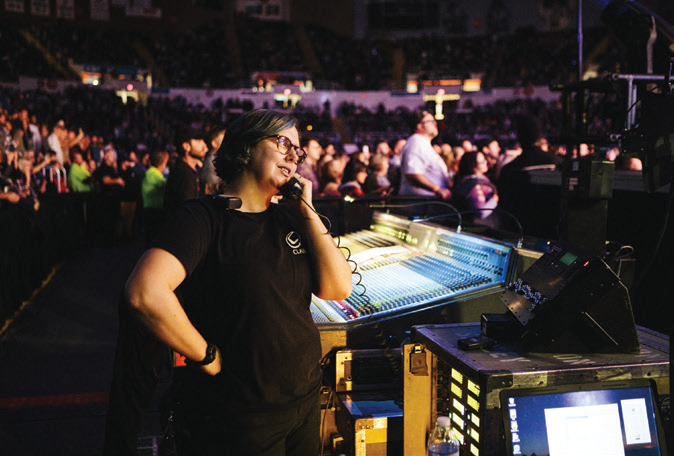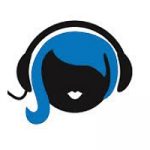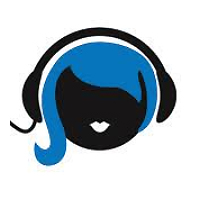A veteran of more than 15 years in professional audio, Rachael Moser has served in multiple roles – PA tech, monitor tech, RF tech, monitor mixer and now system engineer/crew chief – with Clair Global in Nashville for more than a decade. A graduate of the Audio Engineering Technology (AET) program at Belmont University in Nashville (also with a minor in Music Business), she grew up surrounded by music.
Her dad was a bass player in a local band and had a full-scale recording studio in his advertising agency where she spent time, and she’d tag along with her parents to concerts, once asking to see a Tina Turner show. “I remember being in awe of everything I was witnessing; the lights, the dancers, everything,” she says. “I also remember whining because it was too loud and being too stubborn to put in earplugs. I find that fact to be quite funny given my current profession. Even though I may have complained, it sparked something inside of me that never burned out. I can still get that feeling of wonder and awe going to a concert.”
Moser played the oboe and alto saxophone in band throughout middle and high school and described herself as a self-certified “band nerd” – a member of the marching band, the backing band for the school’s competitive show choirs, the pep band for basketball games, and the orchestra for school musicals. “If I wasn’t in class or working on a video project, I was probably in the band room,” she adds. “I enjoyed playing music, but I didn’t love performing. When I found a way to combine my love for music and technology, my passion for playing began to take a backseat.”

She also worked with the student television team and became an assistant for her video communications teacher where she could work on editing segments for the daily news and short films that students had put together. Her introduction to audio happened in a digital media class, where she learned Pro Tools and recording. She soon realized she wanted to pursue an audio career, although she wasn’t thinking about live sound.
“I wanted to be a producer and own my own independent record label at the same time,” she explains. “I started looking at various colleges and universities that offered music business degrees along with audio programs. I visited a few different colleges, but none felt like the right fit. One day my dad ran into my middle school band director while out shopping. He suggested I check out Belmont, and after my first campus visit, I knew it was where I could get a practical, hands-on education while in a small university environment. I would also have access to top-quality internships and job opportunities by being in Nashville, with Music Row just down the road. I knew it was where I needed to be.”
Finding The Way
In Moser’s third semester, she was introduced to live sound and the light really came on: “I had a totally different audio passion. It didn’t come as much of a surprise seeing how much of a connection I felt going to concerts. I switched my major to audio engineering technology but kept a minor in music business. I knew there was value in understanding how this industry and the music business works.”
One of her first jobs in the industry was working for the student-run live sound company Clear As A Bell. The students were responsible for advancing, prepping, and working all shows they booked under the faculty advisor’s supervision, and she notes that it was a great introduction to knowing what it takes to work a show from start to finish.

As part of the live sound curriculum, students also worked on a series of showcases, which were full-scale productions presented six times a year in the campus arena. At one of those showcases she was introduced to Clair and went on to gain experience working alongside the company’s system engineer and monitor tech – flying the PA, ringing out wedges, and mixing front of house and monitors. It led to setting a goal to work at Clair and move her way up to system engineer.
Moser began working with Clair in the Nashville shop during her last semester at Belmont as part of a student work partnership, spending a couple of days a week assisting in whatever department needed help at the time. One day it could be getting PA systems tested and ready for a tour, another in could be in tour prep, packing caddies, and helping the touring staff get their stage and console packages together. It was invaluable experience in learning how each department worked and seeing how each tour came together.
After graduation, she was offered a full-time position in the electronics department, assembling racks, and spent the next three years working in the electronics shop, specializing in wireless and intercom systems. She briefly moved to company headquarters in Lititz, PA to complete the road staff training program before returning to Nashville and touring in various roles ever since.
Against that backdrop, let’s learn more with a Q&A session.
Q: How did your first internships and jobs help build a foundation for where you are now?
Moser: In my early years, I learned a lot about myself and who I wanted to be. Starting out, I was so shy and intimidated by everyone else in my classes. It seemed everyone else was further along in their knowledge of audio or had already been working in audio for a few years. I felt behind the curve, and like I would never catch up. I knew the only way to overcome any of that doubt was to put my head down and learn. I took every job and internship as an opportunity to advance further. Not every internship I had was fulfilling from the technical standpoint, but I learned where I wanted to end up and what I wanted to achieve.
When I was first starting out at Clair after college, I was offered the opportunity to run sound for a new worship service starting at a local church. It was an entirely new system that was installed, and I was walking into it about a week before the first service. I was doing it all, setting up the tech cart (the console was a Yamaha LS9 that was on a cart with the lighting console that rolled out of a storage closet and patched into a column in the center of the room), patching the stage, running monitors from front of house, etc.
That job taught me a lot about self-sufficiency and time management. I absolutely loved running sound at the church and continued to do so for several years until I started touring, and I still occasionally fill in if I’m home on a Sunday morning.
Q: Did you have a mentor or someone that helped you?
Moser: There have been many people who have been big influences throughout my career. However, a few really stand out as ones who have helped me along the way. Jeff Briggette was one of the first people to see potential in me as an RF tech when I started building wireless systems. He helped push for me to go on my first broadcast gig to gain real experience. Every time I’ve worked with him since he has continued to offer knowledge and experience that I continue to use throughout any RF work I do.
Another is Robert Bull. I’ve had the privilege to work with and learn from him for several years now. Whether I’m needing guidance through a tough moment in my career or celebrating even the smallest of victories, Bull has been someone who I can go to for advice or help. If I’m struggling with my monitor mixes and have dug myself into a hole I can’t get out of, Bull is the first person who is there to not only help get it sorted but teach along the way.
Q: What’s a typical workday like?
Moser: It starts with me walking into the venue and looking around to see what we can look forward to for the day. I usually have a checklist of questions that I try to get the answers to before load-in begins. I also determine how we’ll be hanging the PA that day. The first thing we see off the trucks is our rigging and power package. We run feeder and get motors prepped to be hung, all before PA starts coming in the door. Once we have PA sorted on the floor, we will see the console and stage packages shortly after.

After the audio gear is in the building, the stage manager gives us eight stagehands to assist with tipping consoles, hanging PA, and setting the stage. Once the PA is at trim, I head to front of house to assist the mix engineer with the system’s tuning. Once that’s complete, and we verify coverage, the audio team heads off to lunch.
Typically, we have a band sound check each day, and during it, I walk the room and verify that we’re covering properly and everything we’ve done to the system is translating well. Once sound check is over, it’s time for the opening acts – some carry their own audio packages while others will utilize a package that we carry with our PA. We assist them in setting up on stage and provide front of house/monitor mixing if requested. Once all sound checks are done, it’s just about time for doors to open.
With just enough time to take a quick breather and grab some dinner, it’s time to head back out for the start of the show. I sit out front for the remainder of the night, making sure everything is working properly with the system, and occasionally I walk the room to make sure we’re still covering well now that the venue is full of people.
Before loadout begins, the PA tech and I meet with the stagehands and go over the game plan. We start at front of house then move over to stage right to begin bringing in PA. Once everything is out and loaded on to the trucks, I shower up, grab some after-show food, and try to get as much sleep as I can.
Q: What do you enjoy the most about your job?
Moser: I was asked recently by someone what is my “why” for doing this job. The best way I could describe it was knowing that I’m a part of something that is bigger than myself. I love being able to be a part of a team that brings to life an artist’s vision and help them present it to their fans every night. Being able to look out and know everyone in the crowd is there feeling a connection in their own way to the artist on stage; it brings a feeling that is indescribable. Even after having toured for several years, I still get that feeling when I go to concerts. I love knowing that I can help bring that feeling to other people.
When it comes to touring, I like the challenge of doing the same thing every day but in a completely different place. Sure, the venues all kind of look the same, and after a while, begin to blur together. However, each place has its own uniqueness that you must learn to work with. I feel like that’s what keeps this job from feeling too monotonous. It’s easy to look at touring as doing the same thing day in and day out: load in, do a show, load out.
However, every day provides its own set of challenges that keep you on your toes. At a given moment, I may be upset at the fact I’m having to do a parking lot party loadout while it’s snowing or that my points took an extra hour because rigging in the building is difficult, but I wouldn’t change it for the world.
Q: What do you like least?
Moser: Being away from loved ones for so long. It’s easy to feel like I’m missing out on big life events or even the simple joys of normal home life. My husband and I both toured and were even lucky enough to tour together for three years. Before that time, though, he was gone nearly 300 days a year, and I was usually on the road when he was home on a break. It was incredibly tough. Not to mention, with both of us on the road, it made having a dog next to impossible, something we both want very much.
Q: What obstacles or barriers have you faced?
Moser: I remember when I first decided to pursue audio, there was a teacher who tried to discourage me from the career because “even though it may seem glamorous, most people don’t make it.” I’ve had to listen to my fair share of both off-handed and direct comments about being a woman in the industry. I can remember sitting in an internship interview and the person across the desk asked me, “Well, what are we supposed to do if a tour doesn’t want a woman on their crew? How would you feel about that?” I felt like it was a trick question, that no matter how I answered I’d get it wrong.
Even now, while rare, I’ll run across the occasional stagehand who seems to have a major issue with me right from the start. Sometimes it’s as subtle as an eyeroll and not listening. Other times it’s a more direct statement of “I don’t work with women.”
Q: How have you dealt with them?
Moser: The best way I’ve found to deal with it is to tune it all out and realize that it’s all just noise. Any person who doubts my abilities and refuses to look beyond my gender is not worth my time or worry. I’m thankful and very fortunate that any obstacles throughout the start of my career were rare, and the majority of teachers, professors and students during my high school and college experience were encouraging. I was not going to let the opinions of one or two people stop me from achieving my goals. Today, I have continued to surround myself with incredible people and work for a company that supports and lifts me up rather than tear me down.
Q: Advice for other women who wish to enter the field?
Moser: Never compare your path to somebody else’s. It’s so easy to get caught up in how much more knowledgeable another person may be or how many other tours that person has done. There may be times where you feel stuck but use that feeling and forage your own way. Never stop learning and never stop growing.















